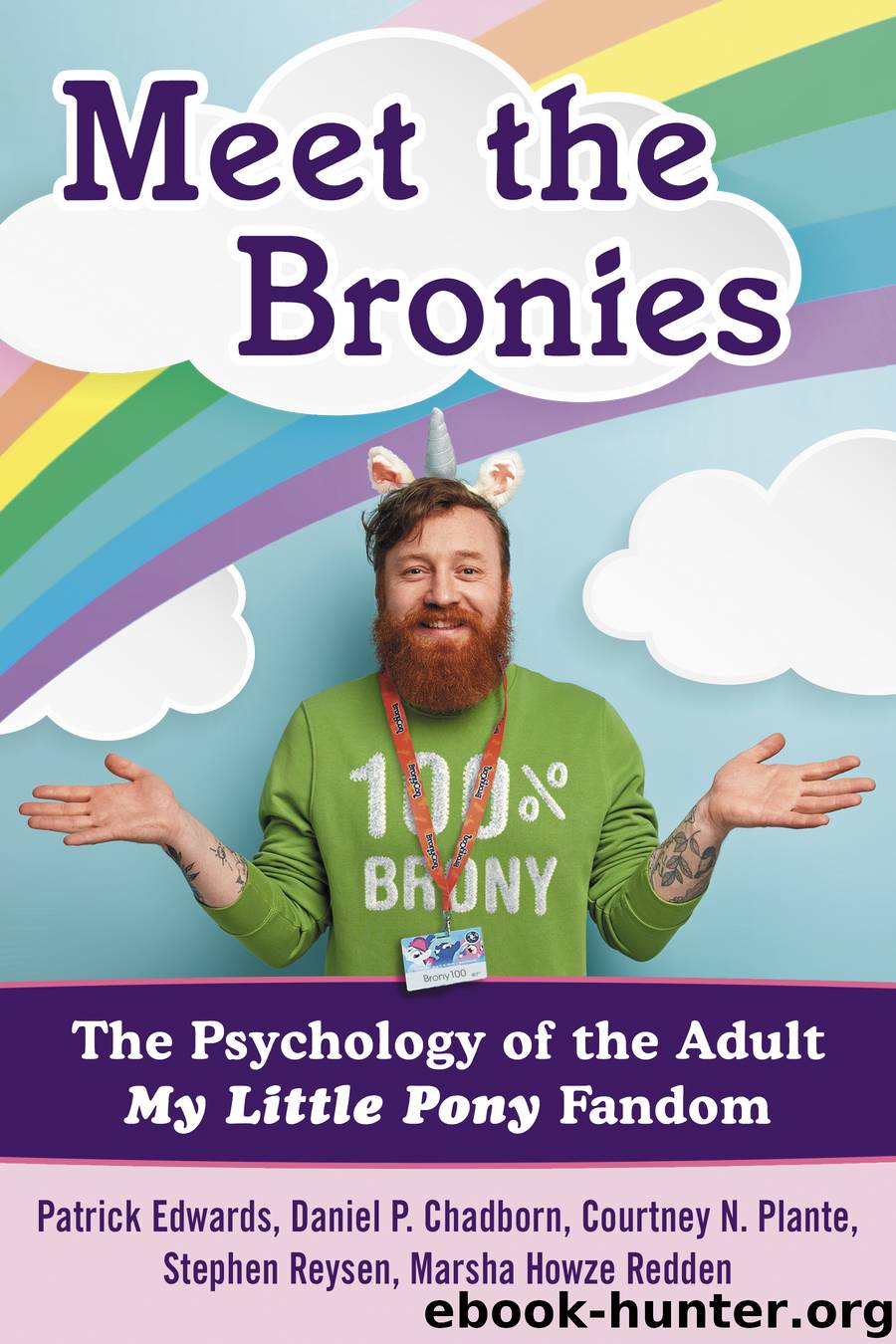Meet the Bronies by Patrick Edwards

Author:Patrick Edwards,
Language: eng
Format: epub
Publisher: McFarland & Company, Inc., Publishers
Published: 2019-09-29T16:00:00+00:00
Bronies and Internet Culture
With the brony fandom arising almost entirely as a result of Internet culture, it makes sense that, in addition to overlapping with various other fandoms, bronies may be part of a broader “Internet culture.” We tested this possibility in study comparing a sample of approximately 600 bronies to a matched control group of non-bronies. Each group was given a questionnaire assessing various aspects of being part of the “net generation” or Internet culture (Edwards et al., 2016).
The results found that, in general, bronies scored higher on traits associated with being part of an Internet-based culture. For example, bronies were more likely to endorse items about having a fundamental right to access information and express opinions—something characteristic of Internet culture. Bronies also expressed greater comfort with new technology and a general tendency toward being tech savvy. Finally, bronies reported feeling less inhibited on the Internet—finding it easier to express themselves online (e.g., through social media).
When it comes to the reasons for using computer technology and the Internet, bronies again show signs of being more involved in an Internet culture than the typical non-brony. Bronies were more likely to use the Internet for entertainment and stress relief purposes. Given that the brony fandom itself originated in a recreational Internet forum (4chan), these results make a lot of sense. Likewise, given that much of the brony fandom is geographically diverse and, as such, communicates with one another online, it would seem to follow that a brony would have to be fairly well-versed with the Internet and fairly comfortable with using it to be able to keep up with and contribute meaningfully to the brony fandom.
That said, there is little evidence suggesting that bronies, despite their more frequent use of the Internet and computers, are addicted to them. These findings are analogous to the conclusions we drew from Chapter 9, which suggested that while bronies have particularly active imaginations, they rarely step over the line into delusion. As such, while bronies spend a great deal of their recreational time interacting with the fandom online, all evidence seems to suggest that they do so in moderation and know how to set appropriate boundaries so that their fan interests don’t interfere with their real-world obligations. We’ll return to this theme of bronies as surprisingly well-adjusted (despite misconceptions to the contrary) in Chapters 17 and 18.
Download
This site does not store any files on its server. We only index and link to content provided by other sites. Please contact the content providers to delete copyright contents if any and email us, we'll remove relevant links or contents immediately.
Rewire Your Anxious Brain by Catherine M. Pittman(18628)
Talking to Strangers by Malcolm Gladwell(13338)
The Art of Thinking Clearly by Rolf Dobelli(10401)
Mindhunter: Inside the FBI's Elite Serial Crime Unit by John E. Douglas & Mark Olshaker(9307)
Becoming Supernatural by Dr. Joe Dispenza(8191)
Change Your Questions, Change Your Life by Marilee Adams(7725)
Nudge - Improving Decisions about Health, Wealth, and Happiness by Thaler Sunstein(7685)
The Road Less Traveled by M. Scott Peck(7579)
The Lost Art of Listening by Michael P. Nichols(7485)
Mastermind: How to Think Like Sherlock Holmes by Maria Konnikova(7310)
Enlightenment Now: The Case for Reason, Science, Humanism, and Progress by Steven Pinker(7300)
Win Bigly by Scott Adams(7179)
The Way of Zen by Alan W. Watts(6587)
Daring Greatly by Brene Brown(6494)
Big Magic: Creative Living Beyond Fear by Elizabeth Gilbert(5733)
Grit by Angela Duckworth(5589)
Ego Is the Enemy by Ryan Holiday(5400)
Men In Love by Nancy Friday(5223)
The Laws of Human Nature by Robert Greene(5149)
